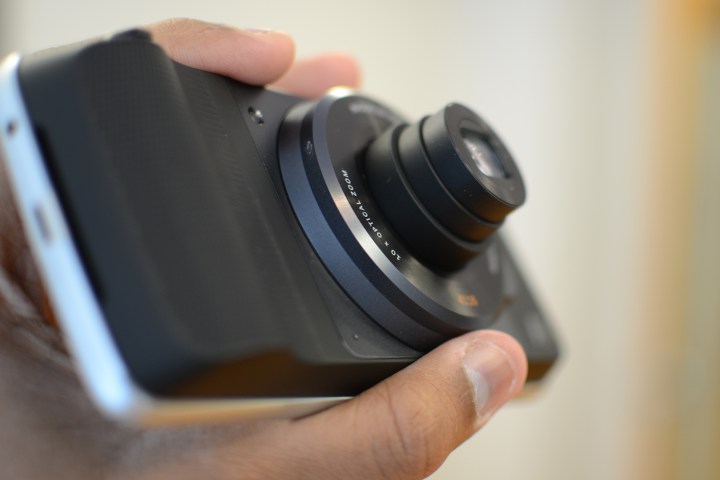
“We know we can’t come up with every Moto Mods idea on our own, and real innovation doesn’t happen behind closed doors,” wrote Motorola in a blog post. “That’s why we shared the Moto Mods Development Kit (MDK) with the world, allowing people everywhere to contribute to the ecosystem by bringing their own Moto Mods to life.”
Motorola is taking a three-pronged approach. First, it’s teaming up with crowdfunding platform Indiegogo and internet provider Verizon to launch the “Transform the Smartphone Challenge,” a contest that tasks entrants with brainstorming ideas for new Moto Mods. Interested participants enter in one of two ways: by submitting an application online, via Motorola’s online developer portal, or by attending a December hackathon in New York or January hackathon in San Francisco. Organizers of the latter will be on hand to help to prototype hardware designs and provide feedback on crowdfunding strategies, Motorola said.
The winners of each competition advance to the next round: bootstrapping a campaign on Indiegogo to help fund their respective Moto Mods’ development. Crowdfunding “experts” will provide advice on campaign strategy, creation, and promotion, Motorola said, “while Moto and Verizon […] help get your campaign in front of Moto Z customers worldwide.”
The ten successfully funded projects of that group will get an all-expenses-paid trip to Motorola’s Chicago headquarters in March 2017, where they’ll pitch their ideas and hear feedback from a panel of Lenovo, Verizon, and their venture capital subsidiaries. Most exciting of all, they’ll be afforded the chance to see their Moto Mods distributed nationwide by Verizon and promoted by Motorola — Lenovo has set aside $1 million to bring “truly outstanding” ideas to market.
Budding entrepreneurs who don’t reach that stage are eligible for a Moto Mods Development Kit and a Moto Z phone, Motorola said.
“It’s really that easy,” said Motorola. “All you need is an idea, the passion to bring it to life, and the financial support to drive a new era of mobile technology forward.”
The competition is an much-needed shot in the arm for the modular phone concept.
LG’s similarly swappable smartphone, the G5, sold poorly, contributing to losses of more than $380 million among the Seoul, South Korea-based’s mobile divisions. Its underwhelming performance — and poor yields, moreover — reportedly prompted the smartphone maker to nix the modular features of its upcoming flagships.
Google, meanwhile, put the kibosh on Project Ara, an ambitious smartphone platform that housed components like cameras, batteries, and wireless radios in thin, removable tile-shaped modules. After numerous delays and the departure of the program’s executive, company brass indicated that a Project Ara smartphone would prove too difficult to market against formidable competition like Apple’s iPhone.
Motorola remains bullish, for its part. And it has cause: during parent company Lenovo’s earnings call in August, CEO Yang Yuanqing told analysts that he was “hopeful” the company’s smartphone business could achieve profitability next year.
“We are invested in the future of the Moto Mods ecosystem and we want to empower developers to dream, build, and fund their own Moto Mods,” Motorola wrote. “Over the next few months, we’ll be introducing new opportunities to help developers get involved.”
The contest ends January 31, 2016.


